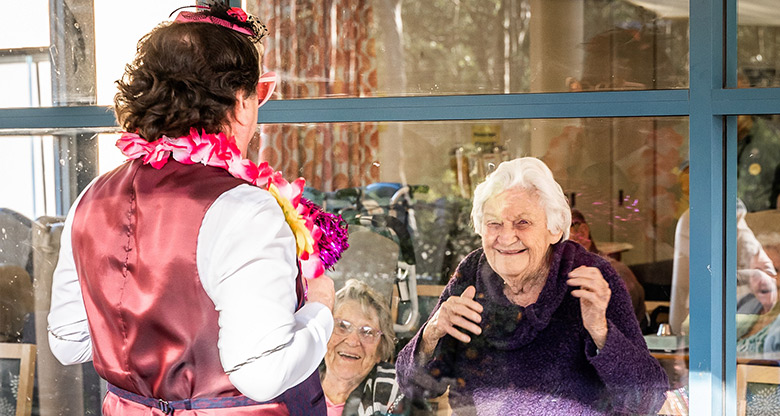For more than 20 years, The Humour Foundation has harnessed the therapeutic benefits of humour to improve the health and wellbeing of vulnerable Australians. With the support of its partners, including CommBank, its team of 70 trained performers deliver its renowned Clown Doctors™ program to children in hospitals and its Elder Clowns™ program to aged care residents living with dementia.
Like many not-for-profit organisations delivering vital services to the community, The Humour Foundation was faced with unique challenges during the pandemic. As the risk of social isolation escalated so did demand for The Humour Foundation’s services among hospitals and aged care facilities. However, social restrictions meant in-person programs could no longer operate the way they once did.
The Humour Foundation’s Chief Executive Officer, Tony Warner, explains that in the face of restrictions, the organisation was simply asked to “find another way” given the need of children in hospitals and aged care residents was amplified by the pandemic.
“We had to quickly retool and move to a virtual setting given the social isolation people were experiencing. It also meant we could interact with individuals we wouldn’t normally be able to see, like those living in remote areas where our face-to-face programs aren’t available.”
The Humour Foundation’s Marketing and Fundraising Manager, Michelle Turpie, added, “the logistical challenge after the pandemic arrived was immense, and the restrictions imposed on us forced us to change direction. But we did rise to that challenge.”
“We launched our virtual Clown Doctors On Call offering for children receiving treatments and arranged for Elder Clown performers to deliver the program from the courtyard at aged care homes as residents watched on and joined with appropriate social-distancing measures in place. It had such a wonderful impact, including for our performers who had been prevented from working.”
Addressing the needs of a sector in crisis
While hospitals had well-documented policies and procedures to manage Coronavirus restrictions, the aged care sector was grappling with a range of issues. Some facilities had to evacuate and relocate residents, families of residents were concerned for their loved ones, and social isolation came even further to the fore.
According to Dementia Australia, 40 per cent of aged care residents didn’t receive any visitors even before the pandemic and Tony says that for people living with dementia, the risk of social isolation is very real. So, for these residents, the continuity of weekly or fortnightly visits from performers was crucial given the change and uncertainty they were experiencing.
I can’t help but wonder whether the confusion and social restrictions that accompanied the pandemic provided some insight into the frustration and disconnection people with dementia experience,” Tony says.
Building on its in-person Elder Clowns program that is designed to provide holistic wellbeing outcomes in line with four of the eight aged care quality standards, The Humour Foundation developed a digital solution.
“We created an online offering as a mechanism to create connections between performers, families and aged care residents. It allowed us to continue to empower residents living with dementia to contribute meaningfully to their environments. All it required was for staff in the facility to take an iPad from one room to the next and we would do the rest.
“Our concern initially was how receptive residents with dementia would be, so we conducted trials with an amazing facility. We had to learn how to do it and the facility had to learn how to receive it.
“Importantly, even if residents had to be relocated or their family couldn’t visit, we could provide a sustainable routine. Residents would know that on Tuesday afternoon, Monty the Elder Clown was coming to visit, and there is proven recall for that even among those with dementia.
“The way we worked during the pandemic wasn’t just about technology,” Michelle added. “One powerful initiative was having the Elder Clowns write a personal letter to residents, and although they couldn’t visit in person, they could connect in this way, and that was really well received.”
Realising broader benefits
Beyond the impact on aged care residents and their families, Tony says that the Elder Clowns program has had the benefit of upskilling staff within the facilities and strengthening their connections with residents.
Tony explains that one of the objectives of the program is to help upskill staff, where the communication between personnel and residents can be more interactional rather than relational. The organisation also works with ‘laughter bosses’ – staff members chosen from the facility – who are trained by The Humour Foundation.
“If we can share the human centred, therapeutic methods we use within the Elder Clowns program with front-line staff, we can help them form better connections with the people they provide personal care to.”
The organisation is now looking at the application of its Elder Clowns program to deliver benefits in other healthcare and community contexts.
“I believe this program is part of the solution, can contribute to better care in facilities, better trained staff and people at risk of social isolation can be better consulted about how they receive care.
“The SMILE study of 400 people and 36 aged care facilities also showed that the Elder Clowns program could reduce agitation in residents at the same level as antipsychotic medications. These are tangible outcomes for people’s quality of life.
“We are now looking at other applications for the program, for example in palliative care or at the end of life, for families and in community settings. Our goal is to grow the program given its impact to date and launch fundraising activity to support it. Its relevance in the wake of the pandemic is greater than it’s ever been.”
As a founding partner, the CommBank Staff Foundation has been proudly supporting The Humour Foundation's Clown Doctors program since 1999.
For more information about The Elder Clown program visit www.humourfoundation.org.au or email [email protected]

